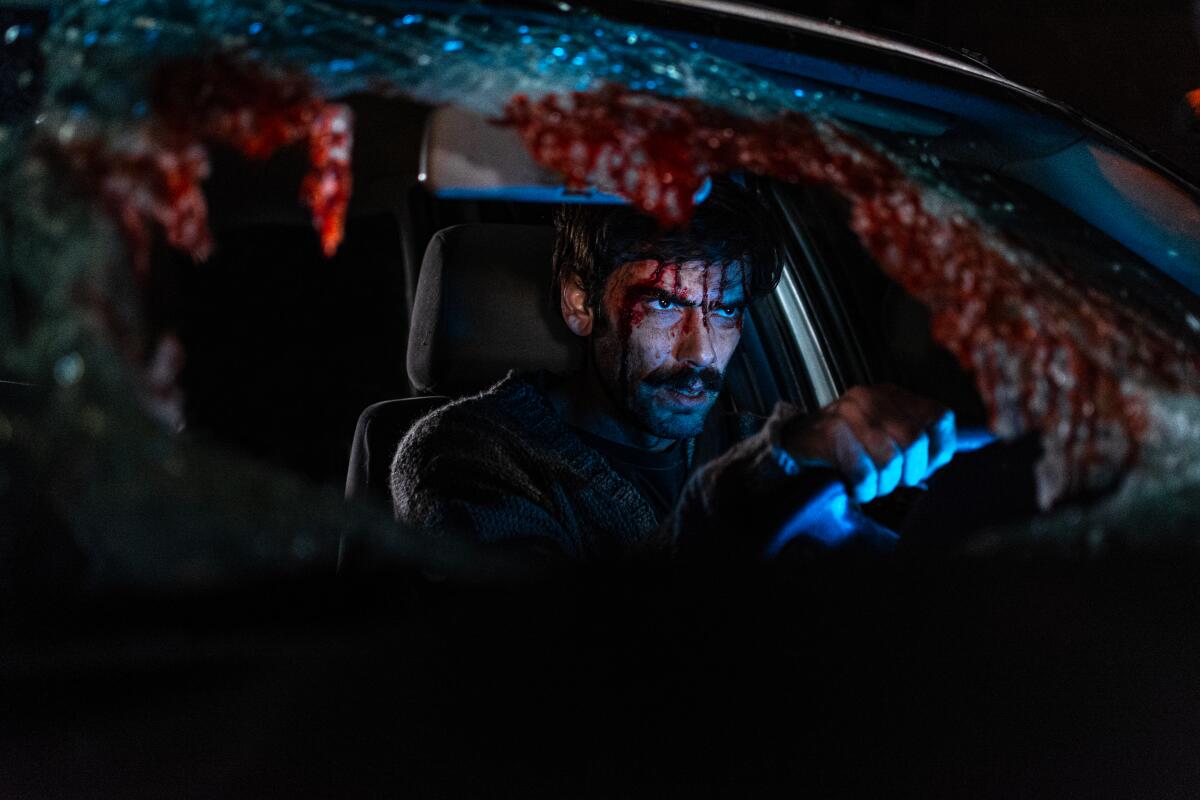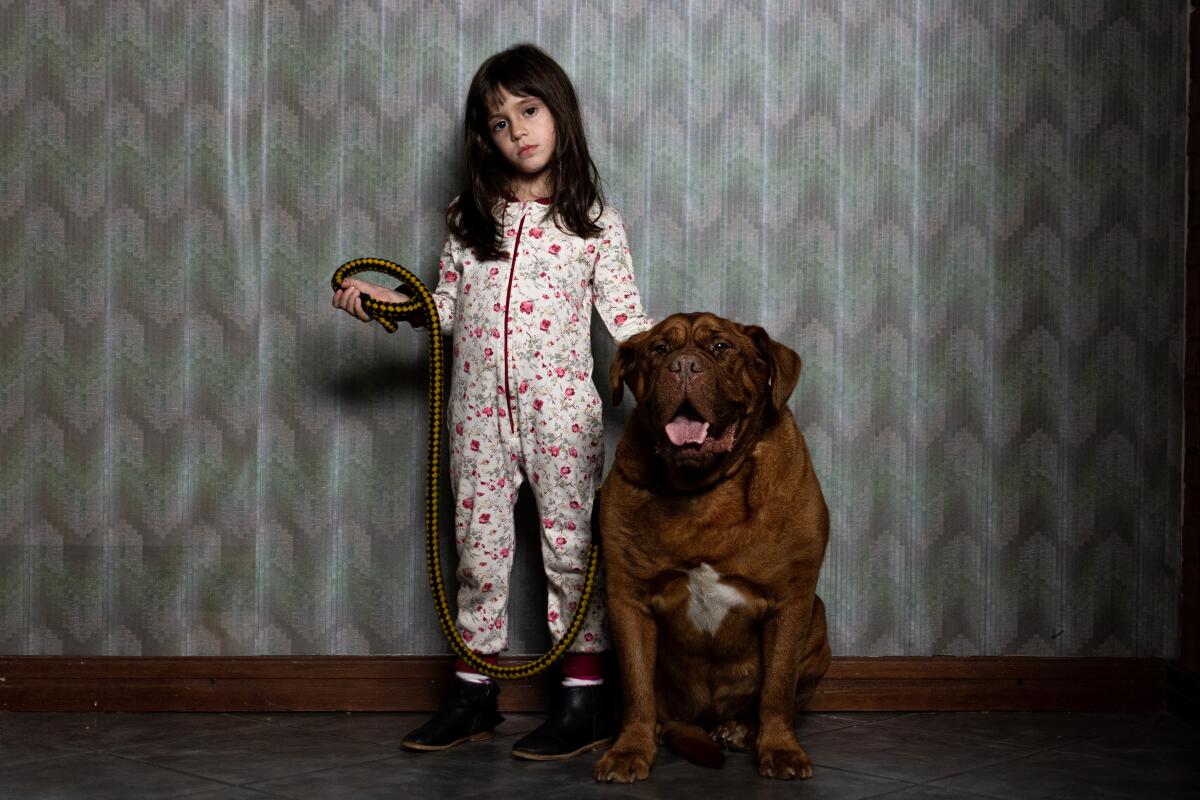Review: ‘When Evil Lurks’ calls back to the times when possession movies kept you guessing

- Share via
“When Evil Lurks,” an enjoyable bit of torture by the filmmaker Demián Rugna, opens with five gunshots in a lonely stretch of rural Argentina. Two brothers overhear the blasts, short-tempered Pedro (Ezequiel Rodríguez) and his mellower sidekick, Jimi (Demián Salomón). The men are alarmed, but not surprised. Something cryptic — something devilish — has cast its shadow over their country for over a decade. Now, death has finally made its way to them. And while these tough guys reach for their own rifles, they’re fairly clueless about how to survive.
Rugna’s taken demonic possession, that increasingly threadbare horror trope, and twisted it around until he found his own angle of attack. He’s interested in two things: dread and dubious Satan-fighting advice. From this first shot, the tension is oppressive. We’re not yet sure what exactly we’re supposed to fear, but we can sense the size of it from the panic in Pedro and Jimi’s eyes. Perversely, when the two seek out the source of the gunfire and find a corpse hacked in half, their nonchalance is even worse. What are they scared of that’s more ghastly than that?
I’ll tell you, a little. There’s a tumorous, oozing, bedridden young man — a rotten, the locals call him — dribbling fluids onto the floor of his family’s crude shack. Ruiz (Luis Ziembrowski), the rich farmer who owns the land, is furious to hear about his pitiful tenant, yet we gather that touching the cursed, let alone hurting one, will be even more ruinous. But I won’t say much else. This is a film that delights in unspoken terrors and audience misdirection.
From there, the threats change shape from scene to scene, while Pedro and Jimi, our sort-of heroes, cling to hopelessly ill-informed tips to evade disaster. Collectively, none of the guidance seems to make sense: Change your clothes. Avoid animals. Stay 300 kilometers away from danger — make that 400 — and don’t use electronics. Does Lucifer really care about cellphones? Or does the film just love an excuse to plunge us into the dark?

Perhaps subconsciously, Rugna’s captured the anxieties of early pandemic when everyone practiced rituals — wash your hands, knot a bandana around your mouth, spray the mail with Lysol — without any confidence that they’d work. There’s a morbidly funny scene when the brothers attempt to flee with their elderly mother (Paula Rubinsztein) and Pedro’s two sons, the elder of whom, Jair (Emilio Vodanovich), is severely autistic. Grandma sings the kiddos a cautionary nursery rhyme and recites the rules. “Never ever name the evil by its name,” she warns, and then instantly breaks that one herself.
The film’s macho saviors struggle to obey the main commandment we believe: For God’s sake, never shoot the possessed. Rugna repeats one image over and over — a man waving a firearm while a woman begs him to stop — twisting each scene into its own nasty variation. There’s a standout screaming match between Pedro and his ex (Virginia Garafalo, giving her big moment the gusto of Shelley Duvall in “The Shining”) that’s bested, barely, by a shot where Ruiz takes aim at a suspicious goat (what modern horror flick doesn’t have a suspicious goat?) while, in the background, his sobbing wife slowly reaches for an ax.
Rugna taunts us with danger. The gore almost never comes as a shock. Instead, he dangles the anticipation of death until the actual carnage is a relief. The violence is brutal and fast and executed without any sympathy for our usual screen pieties. (Be warned: Kids aren’t safe.) The only problem with the action is it’s so skillfully done that you’re frustrated that there isn’t more of it. The director’s whipped us up into blood fiends, an uncomfortable feeling when you’re, say, staring at a room of elementary schoolers wondering who’s going to get the chop. (The best one-liner comes when Silvina Sabater, playing a retired preacher, deadpans, “Evil likes children, and children like evil.”)
The plotting is relentless with scant time spent on getting to know our leads as individuals, so it’s confounding when the climax suddenly seems to mistake this roller coaster for a character-driven tragedy. There’s no harm in aspiring to grand emotions, but the story has rushed the beats that would elevate the final wallop from good to excellent. No matter. As the film itself proves, not every Hail Mary works.
'When Evil Lurks'
Not rated
In Spanish, with English subtitles
Running time: 1 hour, 39 minutes
Playing: In wide release; streaming on Shudder on Oct. 27
More to Read
Only good movies
Get the Indie Focus newsletter, Mark Olsen's weekly guide to the world of cinema.
You may occasionally receive promotional content from the Los Angeles Times.










